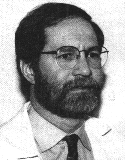There is a widely held perception that NIDA supports only scientific studies of illicit drugs. The research of MERIT award winner Dr. Neal Benowitz, however, demonstrates NIDA's commitment to understanding nicotine addiction, described by many as America's greatest public health challenge.
In fact, Dr. Benowitz is convinced that NIDA has led the research on why people smoke and how tobacco use might be reduced. The studies have resulted in great rewards for the American people, he says. "I personally believe that NIDA-supported research on nicotine and tobacco addiction has resulted in greater health benefits for the United States than any other program," says Dr. Benowitz.
 Dr. Neil Benowitz
Dr. Neil BenowitzDr. Benowitz, a professor of medicine, psychiatry, and pharmacy at the University of California at San Francisco, is one of the world's experts on the effects of nicotine and how it is broken down in the blood and removed from the . His career is studded with research achievements that have helped explain the addictive nature of nicotine and tobacco and the role nicotine and other substances in tobacco smoke play in various diseases.
Dr. Benowitz began studying nicotine and its effects on people in 1975 when that area of research was in its infancy. His early investigations showed how nicotine behaves in the blood and how it is metabolized or broken down by the . One focus of his research has been "to explain the relationships between levels of nicotine in the and effects on the heart and blood vessels over time as well as the effects of nicotine on smoking behavior," he says.
Dr. Benowitz's research has influenced policy and treatment strategies. For example, his research on nicotine addiction among young people contributed to greater restrictions on smoking in schools. Preventing smoking among youth is key, he says. "Within 3 years they become addicted," he notes.
In studies of smoking behavior, Dr. Benowitz found that many smokers compensate or "oversmoke" when they switch to light or ultra-light cigarettes. That is, they inhale more tar and nicotine-sometimes much more-than the yields indicated on cigarette packs that are determined by the Federal Trade Commission (FTC) test methods described below.
At a recent National Cancer Institute national conference, these findings provided important evidence that the FTC may need to adjust its standard cigarette test method. With the present FTC test method, machines "smoke" cigarettes in a set manner, regardless of brand or tobacco strength. The machines do not cover up ventilation holes in filters or puff more frequently if they "sense" a lower yield of tar and nicotine, as living smokers do. "The current method is totally misleading," says Dr. Benowitz. "It assumes people smoke like test machines." Smokers strive to "maintain a desired level of nicotine in the ," he says.
Dr. Benowitz's research also has provided a means for determining exposure to tobacco smoke through measurement of nicotine and its products in blood, urine, and saliva. The measurements can show how much a smoker is smoking and the degree to which nonsmokers are breathing "secondhand smoke." Thus, it is possible to estimate health risks for nonsmokers.
In addition, Dr. Benowitz has carried out important research on the role of smoking in atherosclerosis, or "hardening of the arteries," and on the absorption of nicotine through the skin via nicotine patches. Smoking can affect what happens to lipids in the blood and the stress on the heart and blood vessels, according to Dr. Benowitz.
He also notes that "blood clotting is a major link between cigarette smoking and heart attack. However, our data suggest that it is not nicotine but something else in cigarettes that causes the clotting," he adds.
While working under his MERIT grant, Dr. Benowitz is shifting his attention from the general population to exploring individual differences in how the human reacts to and handles nicotine. Important findings are surfacing in his study of the metabolic breakdown of nicotine in people in different ethnic groups.
"We have confirmed that African Americans metabolize nicotine differently than Caucasian Americans," reports Dr. Benowitz. Specifically, cotinine-a major byproduct in the metabolism of nicotine-is broken down more slowly in the blood of African-American smokers. This finding may help answer questions that nag Dr. Benowitz: "Why do African-American smokers have a greater risk of cancer than Caucasian smokers who smoke the same number of cigarettes? Is it because they metabolize nicotine differently, which influences their smoking behavior, or do they puff cigarettes more intensively and take in more smoke per cigarette?"
It is not yet known how the differences in metabolism relate to differences in smoking behavior and addiction. However, this ground-breaking research is expected to provide valuable information in the continuing effort to better understand nicotine addiction and to build more effective smoking control programs.
Dr. Benowitz received his M.D. degree in 1969 from the University of Rochester School of Medicine in New York. Following a 2-year internship and residency at the Bronx Municipal Hospital Center in New York City, he accepted a research fellowship in clinical pharmacology in 1971 at the University of California at San Francisco, where, today, he is chief of the Division of Clinical Pharmacology and Experimental Therapeutics. His research on nicotine addiction, the effects of environmental tobacco smoke, and cigarette test methods has had a major impact on the continuing debate about the public health issues surrounding smoking.
